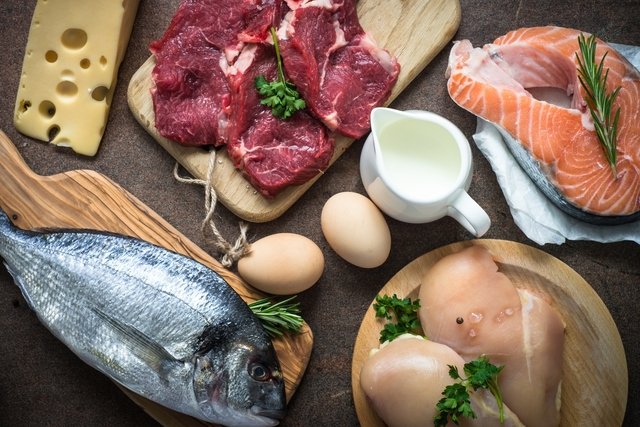Phenylalanine is an essential amino acid that must be obtained from food. This amino acid is important for the production of other proteins and the formation of neurotransmitters, such as dopamine and epinephrine, which help improve memory and mood.
Phenylalanine is found naturally in the form of L-phenylalanine and D-phenylalanine in protein-rich foods, such as eggs, soy, cheese, chicken and meat, or can be used by industry, contained in the sweetener aspartame, to sweeten foods. In addition, phenylalanine is also sold in the form of supplements.
However, this amino acid should not be consumed by people with phenylketonuria, a genetic disease where the body cannot metabolize phenylalanine, which can cause convulsions and hyperactivity, for example. Learn more about phenylketonuria.

What is phenylalanine used for?
Phenylalanine is an amino acid used for protein synthesis and also in the production of tyrosine, an amino acid that acts in the production of neurotransmitters such as epinephrine, norepinephrine and dopamine in the body.
Therefore, the possible health benefits of phenylalanine are:
1. May relieve chronic pain
Phenylalanine has the ability to increase levels of endorphins in the brain, substances that have a natural analgesic effect, reducing chronic pain and discomfort, such as osteoarthritis, rheumatoid arthritis and back pain.
However, the phenylalanine supplement should only be used to complement treatment and under the recommendation of a doctor.
2. May combat anxiety and depression
Phenylalanine acts in the production of dopamine, epinephrine and norepinephrine, neurotransmitters that help regulate mood and promote a feeling of well-being and pleasure, combating symptoms of anxiety and depression. Learn more about dopamine.
Therefore, phenylalanine supplementation can help combat anxiety and depression. However, more studies are still needed to prove this benefit.
3. It can help with weight loss
Phenylalanine acts in the formation of cholecystokinin, a hormone that transmits satiety signals to the brain, reducing hunger. Therefore, consuming foods that are sources of phenylalanine can help with weight loss.
However, more studies are essential to confirm the benefits of this amino acid for weight loss.
4. Treat vitiligo spots
Phenylalanine acts in the production of melanin, the substance that gives color to the skin, hair and eyes and which is lacking in people with vitiligo, a condition characterized by altered function of the cells responsible for the production of melanin.
Therefore, treatment using phenylalanine supplements and exposure to UVA radiation helps treat vitiligo spots. Additionally, applying creams with L-phenylalanine also appears to increase results. Check out other treatment options for vitiligo.
5. It can help in the treatment of various diseases
Phenylalanine is important for the formation of tyrosine, another amino acid that acts in the production of neurotransmitters such as norepinephrine and dopamine, and can help in the treatment of problems such as symptoms of alcohol withdrawal, attention deficit and Parkinson’s disease, for example.
However, more studies are needed to prove the effectiveness of phenylalanine in treating these conditions.
Difference Between Phenylalanine and Tyrosine
Tyrosine is a non-essential amino acid, that is, it is produced by the body from phenylalanine. Furthermore, this amino acid can also be obtained through the intake of some foods, such as cheese, fish and nuts, for example, which can be consumed by people with phenylketonuria.
Phenylalanine is an amino acid that is not produced by the body and, therefore, must be obtained through the consumption of foods such as milk, beef, cheese and eggs, or supplements. Phenylalanine cannot be consumed by people with phenylketonuria.
Foods rich in phenylalanine
The main foods rich in phenylalanine are:
- Carnes, such as pork, beef, chicken, duck and turkey;
- Dairy, such as cheese, milk, butter, cream and yogurt;
- Foods with soy, such as soy sauce, tofu, soy drink and tempeh;
- Seeds and nuts, such as peanuts, pumpkin seeds, chia or sunflower seeds;
- Fishes and sea food, such as sardines, salmon, tuna, shrimp, lobster and oysters;
- Legumes, such as beans, soybeans, chickpeas and lentils;
- Wheat foods, such as cake, white bread, wholemeal bread;
- Built-ins, such as sausage, sausage, bacon and ham.
Additionally, products with aspartame, a sweetener used as a sugar substitute in soft drinks and sweets, are also rich in phenylalanine. Check out other foods that contain phenylalanine.
Is phenylalanine bad for your health?
The consumption of foods and supplements with phenylalanine by healthy people is not harmful.
However, people with phenylketonuria should consume small amounts of this amino acid. This is because this disease prevents the conversion of phenylalanine into tyrosine, promoting the accumulation of phenylalanine in the blood and causing problems such as hyperactivity, convulsions and skin wounds, for example.
Therefore, phenylalanine should be consumed in moderation by people with phenylketonuria, and the permitted amount varies depending on age. See the amount of phenylalanine recommended for people with phenylketonuria.

Sign up for our newsletter and stay up to date with exclusive news
that can transform your routine!
Warning: Undefined array key "title" in /home/storelat/public_html/wp-content/plugins/link-whisper-premium/templates/frontend/related-posts.php on line 12
Warning: Undefined array key "title_tag" in /home/storelat/public_html/wp-content/plugins/link-whisper-premium/templates/frontend/related-posts.php on line 13



